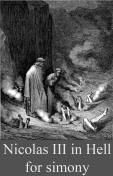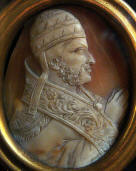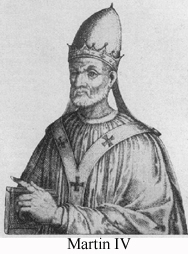Unfortunately for Charles, the Tunis crusade proved costly with
regards to his efforts in the Levant. On returning to Sicily his fleet was
caught in a storm and severely damaged. Moreover, the Pope had died in the
same year and the newly elected Gregory X was determined to resolve the
conflict between the Latin and Eastern churches through negotiation if
possible. Charles was able to insert himself into the Balkans and obtain
the dubious title of King of Albania through a treaty in 1267 and family
marriages with Guillame Villehardouin, prince of Achaia. However, Charles
was continually restrained by the Holy See from more direct action,
despite continually striving to convince the papacy to abandon the
negotiations and call a crusade against Constantinople. By 1277 he was in
direct conflict with Byzantine forces in Greece, and, through further
political machinations, he had managed to become the King of Jerusalem by
purchasing the title from the rightful heiress.
It was such expenditures and the taxes to support them that
 were bleeding the people financially and fermenting growing discontent.
were bleeding the people financially and fermenting growing discontent.

Despite his successes and maneuvering, Charles had to suffer under two more popes who essentially followed Gregory's policies of non-belligerence towards Constantinople. He was particularly upset with Pope Nicolas III's (right) familial machinations with the Rudolph I of Hapsburg. Moreover, there is some evidence to suggest he was discussing with John of Procida an alliance with Emperor Michael of Byzantium to actually overthrow Charles. Nicolas earned a reputation for corruption, particularly simony (sale of ecclesiastical offices). In his Divine Comedy, Dante would place him roasting upside down in the eighth level of Hell in punishment for committing simony.
However, Charles's fortunes
seemed to change in 1280 with the death of Nicolas III.
Charles had had enough of troublesome popes and interveneed directly in the next papal election
by throwing in jail cardinals who disagreed with him. Intimidated by Charles the cardinals
quickly elected Simon of Brie to the pontificate in 1281. His forced election was so controversial
he had to be crowned at Viterbo, as Rome had become too danerous for him to enter.
Simon was a true French patriot. He had
been a member of the council of Louis IX and had been named chancellor and
holder of the Great Seal in 1260, an office he held until his election as
cardinal in 1261. He had operated as papal legate and was deeply entiwned in Sicilian politics.
Unlike his predecessors, Simon, now called Pope Martin IV,
was quite willing to accommodate a member of the French royal family. In
July 1281 he excommunicated the Byzantine Emperor and openly made
 arrangements with Charles of Anjou for a crusade against Constantinople in
April of 1282.
arrangements with Charles of Anjou for a crusade against Constantinople in
April of 1282.
Charles moved swiftly to prepare for the crusade and began to enlarge his already substantial naval force. We are not sure of the size of the fleet he had assembled by 1282, but he probably had over fifty galleys supported by another thirty to forty auxiliaries. The resources required to maintain a fleet of this size were staggering. All told, the cost of preparations for the fleet must have exceeded 50,000 ounces of gold, which was a tremendous sum. To support the project Charles had to increase taxes. Between January 1, 1281 and December 18, 1281 the subvention increased from 72,305 ounces to 107,891 ounces. Even this increase would have been barely sufficient. Considering that this enterprise was absorbing at least fifty percent of the income of the kingdom, even after a forty-nine percent increase in the general subvention, it becomes apparent that the force Charles was assembling for his crusade was creating a financial burden the kingdom could not long bear.
As the year 1282 started, Charles appeared to be in unassailable position. He controlled Anjou and Provence in France, held the title of the King of Sicily and Jerusalem, and was in possession of a substantial portion of the Balkans. Not only had his substantial resources allowed him to assemble a formidable military force, but he also had the financial and moral backing of the papacy. To any onlooker, he would have certainly appeared as one of the most powerful potentates in Christendom. Yet in the spring of 1282 the very means that he had employed to bring him to this point would ultimately undermine his ambitions, and a rising maritime power in the Western Mediterranean, which he had virtually ignored, would move decisively to challenge the Angevin position.


